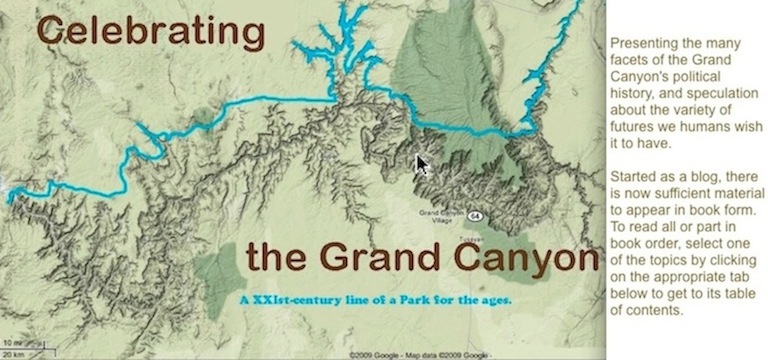THE NORTHWEST HAS NO CLOUT:
WOULD THE GRAND CANYON DAMS HAVE BEEN BUILT?
There are the what-if games played with history; there are the erroneous, even willful, interpretations. Byron Pearson's Saving Grand Canyon is fatally flawed as an academic history by the latter -- his failed book-long rant at environmentalists, and in particular the Sierra Club as the Grand Canyon's saviors.
Playing the what-if games, however, I have found an intriguing and educational antidote, since they permit an examination of the roles of various actors under conditions that did not quite prevail. For instance, it is a linch-pin of any solid understanding of the 1965-8 legislative history of the Colorado River Basin Act to understand the multi-diimensional influences that gave Washington's Democratic Senator Henry Jackson, Interior & Insular Affairs Committee Chairman (and there are a bunch of those influences in that titling) his central position in shaping the legislation. So, suppose we take out of the CRB legislation story Jackson's position and convictions and motivations and support. Suppose that there had been no central figure from the Northwest, Jackson or another. Suppose, that is, that the political balances in the Senate were much like those in the House, where Northwest Representatives were eloquent and determined, but of little impact on the Arizona-Colorado-California alliance that drove the process.
Playing the what-if games, however, I have found an intriguing and educational antidote, since they permit an examination of the roles of various actors under conditions that did not quite prevail. For instance, it is a linch-pin of any solid understanding of the 1965-8 legislative history of the Colorado River Basin Act to understand the multi-diimensional influences that gave Washington's Democratic Senator Henry Jackson, Interior & Insular Affairs Committee Chairman (and there are a bunch of those influences in that titling) his central position in shaping the legislation. So, suppose we take out of the CRB legislation story Jackson's position and convictions and motivations and support. Suppose that there had been no central figure from the Northwest, Jackson or another. Suppose, that is, that the political balances in the Senate were much like those in the House, where Northwest Representatives were eloquent and determined, but of little impact on the Arizona-Colorado-California alliance that drove the process.
